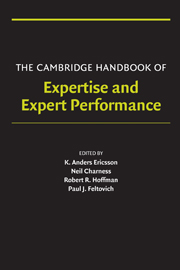Book contents
- Frontmatter
- Contents
- Acknowledgments
- Contributors
- PART I INTRODUCTION AND PERSPECTIVE
- PART II OVERVIEW OF APPROACHES TO THE STUDY OF EXPERTISE – BRIEF HISTORICAL ACCOUNTS OF THEORIES AND METHODS
- PART III METHODS FOR STUDYING THE STRUCTURE OF EXPERTISE
- PART IV METHODS FOR STUDYING THE ACQUISITION AND MAINTENANCE OF EXPERTISE
- 15 Laboratory Studies of Training, Skill Acquisition, and Retention of Performance
- 16 Retrospective Interviews in the Study of Expertise and Expert Performance
- 17 Time Budgets, Diaries, and Analyses of Concurrent Practice Activities
- 18 Historiometric Methods
- PART V DOMAINS OF EXPERTISE
- PART VI GENERALIZABLE MECHANISMS MEDIATING EXPERTISE AND GENERAL ISSUES
- Author Index
- Subject Index
- References
16 - Retrospective Interviews in the Study of Expertise and Expert Performance
from PART IV - METHODS FOR STUDYING THE ACQUISITION AND MAINTENANCE OF EXPERTISE
- Frontmatter
- Contents
- Acknowledgments
- Contributors
- PART I INTRODUCTION AND PERSPECTIVE
- PART II OVERVIEW OF APPROACHES TO THE STUDY OF EXPERTISE – BRIEF HISTORICAL ACCOUNTS OF THEORIES AND METHODS
- PART III METHODS FOR STUDYING THE STRUCTURE OF EXPERTISE
- PART IV METHODS FOR STUDYING THE ACQUISITION AND MAINTENANCE OF EXPERTISE
- 15 Laboratory Studies of Training, Skill Acquisition, and Retention of Performance
- 16 Retrospective Interviews in the Study of Expertise and Expert Performance
- 17 Time Budgets, Diaries, and Analyses of Concurrent Practice Activities
- 18 Historiometric Methods
- PART V DOMAINS OF EXPERTISE
- PART VI GENERALIZABLE MECHANISMS MEDIATING EXPERTISE AND GENERAL ISSUES
- Author Index
- Subject Index
- References
Summary
“If we want to know how people become extraordinary adults, we can start with some of the latter … and then try to find out how they came to do it” (Gruber, 1982, p. 15). That is the premise for retrospective interviews in the study of expertise and expert performance.
As this Handbook makes quite clear, there is a large body of work that coalesces around what Gruber (1986), again, calls “an interest in … human beings … at their best” (p. 248). Only a very small portion of that work uses the method of retrospective interview. But findings from retrospective interview studies have been important in their own right and of significant use to others studying expert performance in other ways. My task in this chapter is to speak about studies using retrospective interviews, to highlight what we have learned from them, to note their strengths and limitations, and to consider where we might head next both in this tradition and as a result of work from this tradition.
In some respects I am well qualified to tackle this task. I served as research coordinator for the Development of Talent Project (Bloom, 1985), work directed by Benjamin Bloom at the University of Chicago in the 1980s and carried out by a large research team. This series of studies has received widespread attention and to some degree has become emblematic of retrospective studies of expert performance.
- Type
- Chapter
- Information
- The Cambridge Handbook of Expertise and Expert Performance , pp. 287 - 302Publisher: Cambridge University PressPrint publication year: 2006
References
- 46
- Cited by

